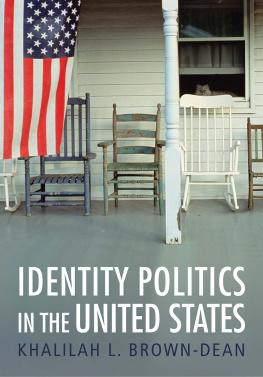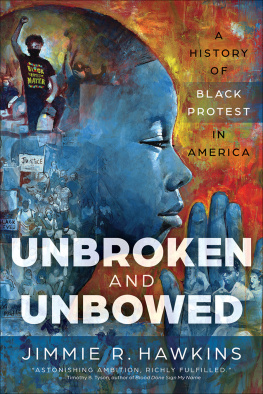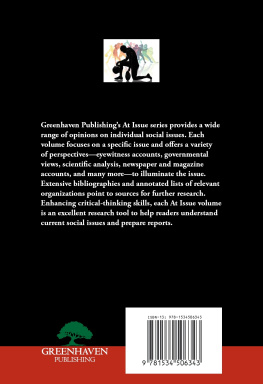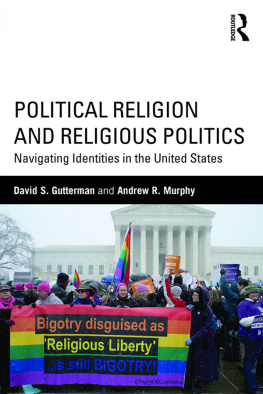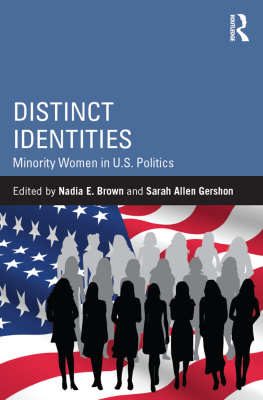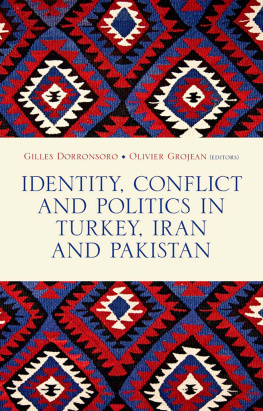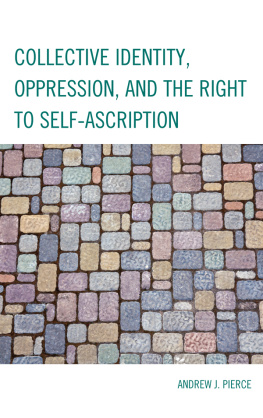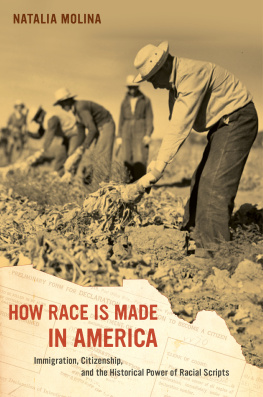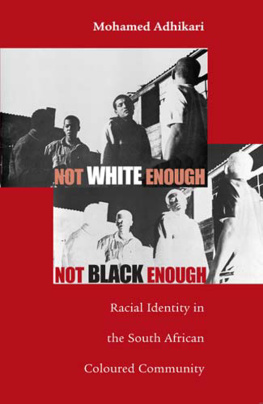
Dedication
For Haley Ann-Helen
May you always know impossible things are happening every day.
Identity Politics in the United States
KHALILAH L. BROWN-DEAN
polity
Copyright Khalilah Brown-Dean 2019
The right of Khalilah Brown-Dean to be identified as Author of this Work has been asserted in accordance with the UK Copyright, Designs and Patents Act 1988.
First published in 2019 by Polity Press
Polity Press
65 Bridge Street
Cambridge CB2 1UR, UK
Polity Press
101 Station Landing
Suite 300
Medford, MA 02155, USA
All rights reserved. Except for the quotation of short passages for the purpose of criticism and review, no part of this publication may be reproduced, stored in a retrieval system or transmitted, in any form or by any means, electronic, mechanical, photocopying, recording or otherwise, without the prior permission of the publisher.
ISBN-13: 978-1-5095-3882-9
A catalogue record for this book is available from the British Library.
Library of Congress Cataloging-in-Publication Data
Names: Brown-Dean, Khalilah L., author.
Title: Identity politics in the United States / Khalilah Brown-Dean.
Description: Cambridge, UK ; Medford, MA : Polity Press, 2019. | Includes bibliographical references and index.
Identifiers: LCCN 2019008489 (print) | LCCN 2019019979 (ebook) | ISBN 9781509538829 (Epub) | ISBN 9780745654119 (hardback) | ISBN 9780745654126 (pbk.)
Subjects: LCSH: Identity politics--United States. | Political participation--Social aspects--United States. | Race--Political aspects--United States. | Ethnicity--Political aspects--United States. | Gender identity--Political aspects--United States. | Identification (Religion)--Political aspects--United States.
Classification: LCC JK1764 (ebook) | LCC JK1764 .B77 2019 (print) | DDC 320.97308--dc23
LC record available at https://lccn.loc.gov/2019008489
The publisher has used its best endeavours to ensure that the URLs for external websites referred to in this book are correct and active at the time of going to press. However, the publisher has no responsibility for the websites and can make no guarantee that a site will remain live or that the content is or will remain appropriate.
Every effort has been made to trace all copyright holders, but if any have been overlooked the publisher will be pleased to include any necessary credits in any subsequent reprint or edition.
For further information on Polity, visit our website: politybooks.com
Acknowledgements
Fifty years after 600 peaceful protesters were brutally beaten during what would become known as Bloody Sunday, my family and I gathered at the base of the Edmund Pettus Bridge in Selma, Alabama. We were there to honor brave visionaries who created political opportunities that many people take for granted. As we approached the bridge, my husband and I noticed our daughters hesitance. She was afraid of what was waiting for us on the other side. We reassured her, then paused to reflect on what those footsoldiers must have felt when they encountered a phalanx of people armed with billy clubs, dogs, tear gas, and a vicious disdain for their very existence. As we stood on the bridge, we heard a group of marchers singing We Shall Overcome: in that moment we questioned just how much had changed since 1965, when Jimmie Lee Jackson and Viola Liuzzo were shot to death simply for demanding access to democracy and equality.
We looked into the crowd and spotted the first two women to legally marry in the state of Alabama. We mouthed a silent thank you as Reverend William Barber II, architect of the Moral Monday movement, marched by. We watched as elders in wheelchairs were escorted by young people whose first introduction to Bloody Sunday happened via a movie screen. We listened as an interfaith group voiced their demands for immigration reform. We stood in solidarity with the formerly incarcerated whose banner advocated not for a second chance but for a viable first chance at achieving the American Dream. We looked back over the bridge and remembered that, less than twenty-four hours earlier, we had stood shoulder to shoulder with people from all over the world as the United States first Black president acknowledged John Lewis, a man who was savagely beaten by state troopers during that fateful march yet overcame permanent injuries to become a member of the United States Congress. We critiqued our own hubris as we listened to the stories of local veterans who had fought for democracy abroad, only to return home and be denied the vote. These men and women removed their hats, held their hands to their hearts, and closed their eyes in reverence as a choir sang the words to Lift Evry Voice. There on that bridge we better understood that American democracy is cloaked in the blood, prayers, and sacrifices of elders who were willing to fight for a future more powerful than the present. That bridge is sacred ground.
The trip to Selma provided the fuel to write this book. Completing it would not have been possible without a legion of supporters. I am grateful to the many students I have taught at the Ohio State University, Yale University, and Quinnipiac University. Portions of this research have been presented at Texas A&M University, Claflin University, Northeastern University, Harvard University, DePauw University, the University of Connecticut Graduate School of Social Work, the College of William and Mary, and the University of North Carolina-Greensboro.
Many thanks to Brandee Blocker Anderson, Nisha Gandhi, Christopher Pagliarella, Corey Scott, and Danielle Tomlinson for research assistance. My colleagues at Quinnipiac have provided support and an overall sense of collegiality that gave me the confidence to embark on this ambitious project. This research has been supported by various grants from the Quinnipiac College of Arts and Sciences and the Provosts Innovation Grants. A special thanks to the Elis Crew for end of semester debriefs and affirmations.
Being an academic is often a lonely enterprise, but my journey has been enriched by a number of colleagues and friends who challenge me, pray for me, inspire me, and, when necessary, laugh with me. Chief among them was the late Professor Mark Sawyer, who was at once my sharpest critic and fiercest advocate. Thanks for teaching me to listen for the sound of el coqui, my friend.
Saladin Ambar, Domonic Bearfield, Niambi Carter, Wartyna Davis, Michael Fauntroy, Jelani Favors, Christina Greer, LHeureux Lewis-McCoy, Shayla Nunnally, DAndra Orey, Ravi Perry, Clarissa Peterson, Kathy Powers, Melanye Price, Melynda Price, Gabe Sanchez, Valeria Sinclair Chapman, Wendy Smooth, James Taylor, Alvin Tillery, Derrick White, and David C. Wilson provided me with valuable feedback and critique on various parts of the project via drafts, affiliated articles, and conference presentations. They are exceptional scholars and even better friends. Thank you to the many people who provided a forum for me to debate and defend the core arguments of this text especially the NCOBPS family. I owe a special debt of gratitude to the hardest working person I know, Jessica Lavariega Monforti, for her copious comments on the early chapters.
I am eternally grateful to Professors Matthew Holden, Paula McClain, and the late William E. Nelson, Jr, for setting the standard and convincing me to pursue a PhD instead of a JD.
Thank you to the anonymous reviewers for insightful critiques that challenged my thinking and helped make the final product much stronger. This book would not be possible without Polity Press, my gracious editor Louise Knight, and Sophie Wright. Thank you for your patience, your guidance, and your unwavering commitment to this project.
Next page
